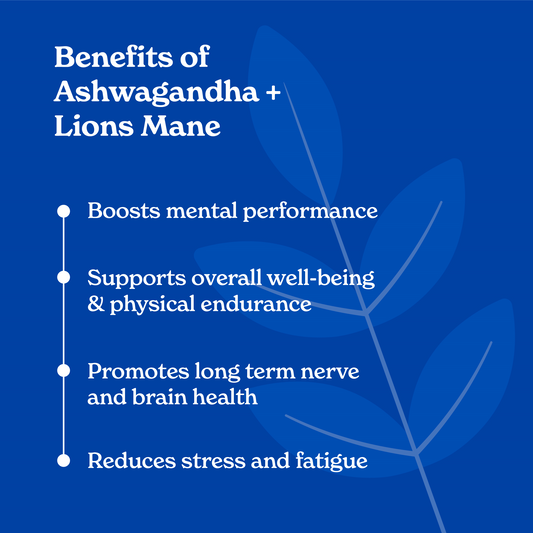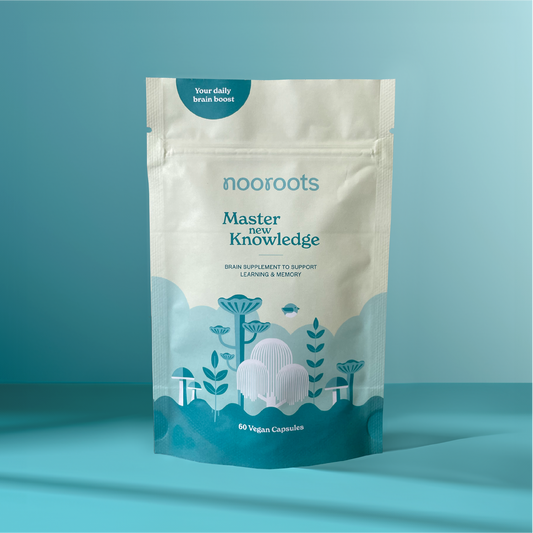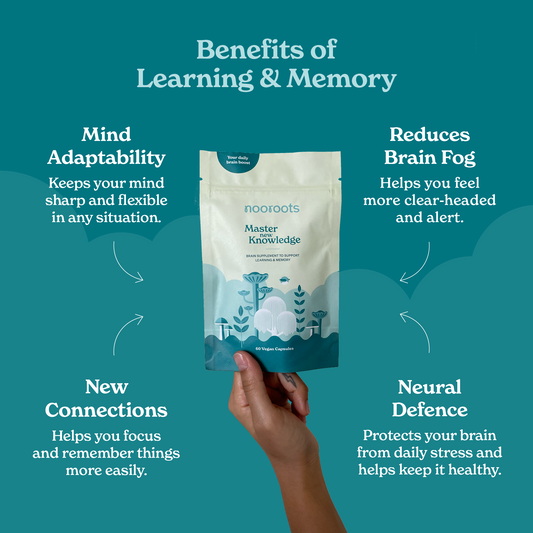Nootropics, commonly known as “smart drugs,” are compounds that support and enhance cognitive functions such as memory, focus, creativity, and mental clarity.
In an era defined by constant stimulation and relentless pace, stress has become one of the most pervasive challenges to both mental and physical health. According to the American Psychological Association, chronic stress remains a leading public health concern, contributing to a wide range of issues including fatigue, anxiety, impaired concentration, and reduced productivity.
As awareness grows around the long-term effects of stress, many individuals are turning toward natural approaches to enhance resilience and cognitive performance. Among these, natural nootropics—bioactive compounds derived from plants, herbs, and functional fungi—have gained considerable attention. These substances work to support the body’s stress-response systems and optimize brain function, often by modulating neurotransmitters, improving cerebral blood flow, and enhancing neuroprotection.
Unlike synthetic alternatives, natural nootropics tend to deliver these benefits with fewer adverse effects, aligning with a broader shift toward holistic, preventive health strategies.
The purpose of this blog is to examine several scientifically supported natural nootropics that may help manage stress and promote mental clarity. By strengthening the brain’s adaptive capacity and maintaining cognitive equilibrium, natural nootropics represent a promising avenue for sustaining focus, calmness, and overall well-being in today’s demanding world.
Contents
- Understanding Stress and Natural Nootropics
- Top Natural Nootropics for Stress Management
- Incorporating Natural Nootropics into Your Daily Routine
The Best Natural Nootropics For Managing Stress

Understanding Stress and Natural Nootropics
Stress is a fundamental biological and psychological response that enables humans to adapt to external pressures or perceived threats. When managed appropriately, it can enhance focus, motivation, and resilience. However, chronic or excessive stress can disrupt the body’s natural balance—known as homeostasis—and contribute to a range of health issues, including fatigue, anxiety, impaired concentration, and weakened immunity.
At the core of the stress response lie two key neurobiological systems: the Sympathetic-Adreno-Medullary (SAM) axis and the Hypothalamic-Pituitary-Adrenal (HPA) axis. The SAM system initiates the immediate “fight or flight” reaction by releasing catecholamines such as adrenaline and noradrenaline, heightening alertness and readiness. The HPA axis, meanwhile, governs longer-term stress regulation through the release of cortisol—a hormone that helps mobilize energy reserves but, when persistently elevated, can impair cognitive performance, mood, and overall health.
Modern lifestyles often sustain activation of these systems far beyond their intended short-term function. Chronic stimulation of the HPA axis, for instance, has been linked to anxiety disorders, depression, metabolic dysfunction, and cognitive decline (McEwen, 2007). As such, strategies that help restore balance to these systems are increasingly recognized as essential for maintaining mental and physical well-being.
Within this context, natural nootropics—bioactive compounds derived from plants, herbs, and functional fungi—have attracted growing interest. Unlike conventional pharmacological agents that often target a single pathway, many natural nootropics act through multiple mechanisms. A subset known as adaptogens helps modulate the body’s stress response, reducing excessive cortisol release while supporting neurotransmitter balance and neuronal health.
Top Natural Nootropics for Stress Management
Ashwagandha
- Origin and Traditional Use: Ashwagandha is a cornerstone herb in Ayurvedic medicine, traditionally used for over 3,000 years in India and North Africa to promote vitality, longevity, and resilience.
- Mechanism: Ashwagandha acts as an adaptogen—modulating the body’s response to stress by regulating the hypothalamic-pituitary-adrenal (HPA) axis and reducing excess cortisol production. It also influences GABAergic and serotonergic systems, promoting calmness and emotional stability.
- Benefits: Clinical trials have shown that standardized ashwagandha root extracts can significantly lower cortisol levels and perceived stress scores, while improving sleep quality and overall well-being. Its neuroprotective and antioxidant properties further support cognitive performance under stress, enhancing both mental and physical resilience.
L-Theanine
- Common Sources: L-Theanine is an amino acid naturally found in green tea (Camellia sinensis), long valued for its relaxing yet non-sedative effects.
- Mechanism: It promotes relaxation by increasing levels of GABA, dopamine, and serotonin, while enhancing alpha brain-wave activity associated with calm focus. L-Theanine also counteracts the stimulating effects of caffeine, resulting in balanced alertness.
- Benefits: Research suggests that L-Theanine supplementation can reduce physiological stress markers, improve attention, and support better sleep quality. It is particularly effective for promoting relaxation and focus during periods of high cognitive or emotional demand.
Rhodiola Rosea
- Background and Historical Use: Native to the cold, mountainous regions of Europe and Asia, Rhodiola rosea has been used in traditional medicine to combat fatigue and enhance endurance.
- Mechanism: As an adaptogen, rhodiola supports the stress-response system by balancing neurotransmitters and regulating cortisol release. It increases cellular energy metabolism and helps protect neurons from stress-induced damage.
- Benefits: Clinical research indicates that rhodiola can reduce fatigue, improve mental clarity, and enhance cognitive performance under pressure. It is especially valued for promoting resilience, motivation, and mood stability in stressful conditions.
Holy Basil (Tulsi)
- Traditional Applications: Ocimum sanctum, or Holy Basil (Tulsi), is revered in Ayurvedic medicine as a “sacred” herb used to promote mental equilibrium and longevity.
- Mechanism: Tulsi exerts adaptogenic effects by modulating the HPA axis and reducing cortisol levels. It also supports immune and metabolic balance, which are often disrupted during chronic stress.
- Benefits: Studies show that Tulsi supplementation can reduce stress and anxiety while improving mood and cognitive function. Its antioxidant and anti-inflammatory effects contribute to overall brain and body resilience, making it a holistic option for stress management.
Vitamins B Complex
- Natural Occurrence and Role: The B-vitamin group—including B1 (thiamine), B2 (riboflavin), B6 (pyridoxine), B9 (folate), and B12 (cobalamin)—plays an essential role in energy metabolism and nervous system regulation.
- Mechanism: B vitamins serve as cofactors in neurotransmitter synthesis, including serotonin and dopamine, which are vital for emotional regulation and stress response. They also help maintain mitochondrial energy production and reduce homocysteine levels, which are linked to stress and cognitive decline.
- Benefits: Regular supplementation with B-complex vitamins has been associated with improved stress resilience, enhanced mood, and better cognitive performance. These essential nutrients support both mental clarity and physical energy, contributing to overall well-being under stress.
Incorporating Natural Nootropics into Your Daily Routine
Tips for Selecting High-Quality Supplements
When selecting natural nootropic supplements, choose reputable brands that provide full transparency about ingredient sourcing, dosages, and clinical evidence. Opt for standardized extracts and bioavailable nutrient forms, and verify that each product has undergone independent third-party testing for purity and potency. Look for certifications such as GMP, NSF, or ISO to ensure manufacturing quality, and avoid proprietary blends or unnecessary additives. Reputable brands should publish Certificates of Analysis (COAs) and comply with relevant regulatory standards to guarantee safety, efficacy, and integrity.
Recommended Dosages and Timing for Optimal Effects
Nootropic dosage requirements differ based on the compound’s properties and each person’s unique biochemistry. For example:
- Ashwagandha: 300–600 mg per day (standardized root extract containing 5% withanolides), taken in the morning or evening with food. Helps regulate cortisol, reduce stress, and improve cognitive resilience and sleep quality.
- L-Theanine: 100–400 mg per day, often taken with caffeine or on its own for calm focus. Best taken in the morning or early afternoon to promote relaxation without drowsiness.
- Rhodiola Rosea: 100–400 mg per day (standardized to 3% rosavins and 1% salidroside), taken in the morning about 30 minutes before breakfast. Enhances stress resilience, reduces fatigue, and improves cognitive performance under pressure.
- Holy Basil (Tulsi): 300–600 mg per day (standardized extract), taken once or twice daily with meals. Supports mood balance, reduces anxiety, and improves focus by modulating the body’s stress response.
- B-Complex Vitamins:
- Vitamin B1 (Thiamine): 10–50 mg
- Vitamin B2 (Riboflavin): 10–25 mg
- Vitamin B6 (Pyridoxine): 10–50 mg Vitamin B9 (Folate): 400–800 µg (as methylfolate)
- Vitamin B12 (Cobalamin): 500–1,000 µg (as methylcobalamin)
It is generally recommended to take these doses in the morning or early afternoon to support daytime focus and minimize potential disruption to nighttime rest.
Advising Consultation with a Healthcare Provider Before Starting Any New Supplement
Before beginning any new supplement regimen, consult a qualified healthcare professional to ensure safety and suitability. This is especially important if you have pre-existing health conditions, are pregnant or breastfeeding, or are taking prescription medications, as certain nootropics may interact with drugs or influence underlying health factors. A healthcare provider can help assess potential contraindications, recommend evidence-based dosages, and tailor supplement use to your individual physiology and cognitive goals.

Conclusion
The natural nootropics explored in this discussion—such as Ashwagandha, Rhodiola Rosea, L-Theanine, Holy Basil, and B-complex vitamins—demonstrate meaningful potential in supporting the body’s adaptive response to stress while enhancing cognitive performance and emotional balance.
Their mechanisms often work synergistically, helping to regulate stress hormones, optimize neurotransmitter function, and protect neural integrity from the effects of chronic stress. Incorporating these compounds mindfully and consistently, alongside foundational lifestyle practices such as balanced nutrition, regular exercise, restorative sleep, and mindfulness techniques, can contribute to a more resilient and focused state of mind. While natural nootropics can play a valuable complementary role in maintaining psychological equilibrium, individual needs and responses vary.
For this reason, it is essential to consult a qualified healthcare professional before beginning any supplementation regimen—particularly for individuals managing existing health conditions or taking prescription medications. With careful integration and professional guidance, natural nootropics can form part of a holistic approach to sustaining mental clarity, composure, and long-term well-being.
Continue exploring the science of smarter nutrition with these related reads:







